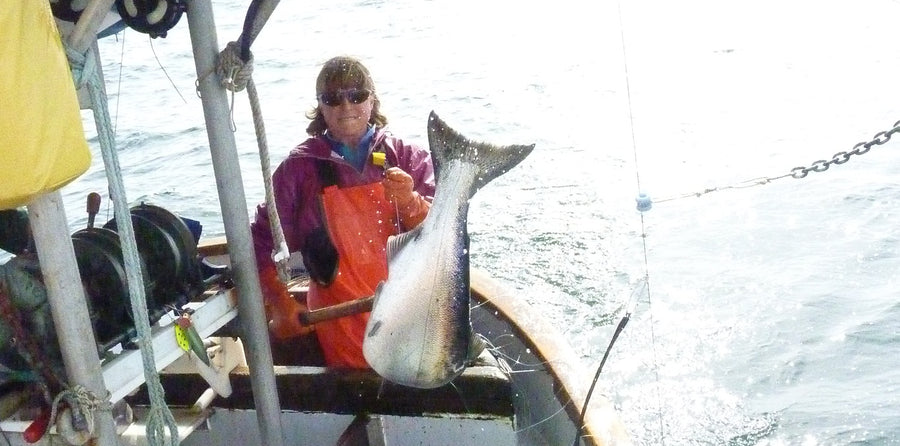
Seafood Producers Cooperative producer/owner Linda Behnken has a long history of advocating for sustainable seafood and the local community small boat fleet in Sitka, Alaska. Which is also one of the reasons why she is a member of Seafood Producers Cooperative, which has supported small boat fishermen for over 75 years.
Linda, like other members of Seafood Producers Cooperative, believe that the small boat fleet is part of smart management of sustainable seafood for the long term. As a policy planner and resource advocate, Linda has served on fisheries management councils like the North Pacific Fisheries Management Council and the Alaska Fisheries Development Foundation. Linda is also Executive Director of Alaska Longline Fishermen’s Association (ALFA). Beyond setting quotas that protect fish and the ocean for the long term, some of the projects these fishermen are working on is mapping habitat, so that fishermen avoid coral rich areas and by-catch of certain species. They are also working on improving fuel efficiency in the fleet, looking at hybrid and electric engines on fishing boats.


Linda started fishing in 1982, crewing on boats during her summers off from Dartmouth. She bought her first boat, a 33-foot Monterrey clipper in 1991. She got her Masters degree at Yale in Resources Management in 1998.
Her two sons, Halen and Rio, ages 11 and 13, started fishing at 6 months of age. In 2008, she bought the Woodstock, a 39-foot troller/longliner, which she uses to troll for salmon and longline for halibut and black cod. She prefers longlining because it gives her more time to spend with her family. While the gear is “soaking” (in the water waiting for fish to bite), she and her family can drop a canoe. “On a good day, trolling is the best, but there are too many decisions to make.”
Linda cares about the future of fishing because she cares about the long term health of the ocean. Her youngest son loves running the fishing lines while her oldest is more interested in electronics and navigation. “Together, they’d make a killer fishing team.” Like other small boat fishing families, she’d like her sons to be able to live the same lifestyle that she lives now with them and to enjoy the health and beauty of the ocean.
You can hear Linda talking about the importance of community and eating wild fish in this beautiful film titled “We Eat Fish” (at the 14:00 mark), which also features SPC member Eric Jordan who fishes on the F/V I Gotta.
One of the best ways consumers at home can help preserve and improve the health of our oceans is to know where their catch comes from, to buy from fishermen who fish in ways that do not cause destruction to the ocean or other reputable sources. It boils down to knowing your catch–the species, who caught it, the method with which it was caught, and whether that method is consistent with supporting the long term health of the ocean. Helping maintain a small boat fleet, whose fishermen are directly linked to the health of the waters and enjoy a deep connection to the ocean, is key to preserving the health of the ocean. Nobody is more connected to the long term health of the ocean than a small boat fisherman
